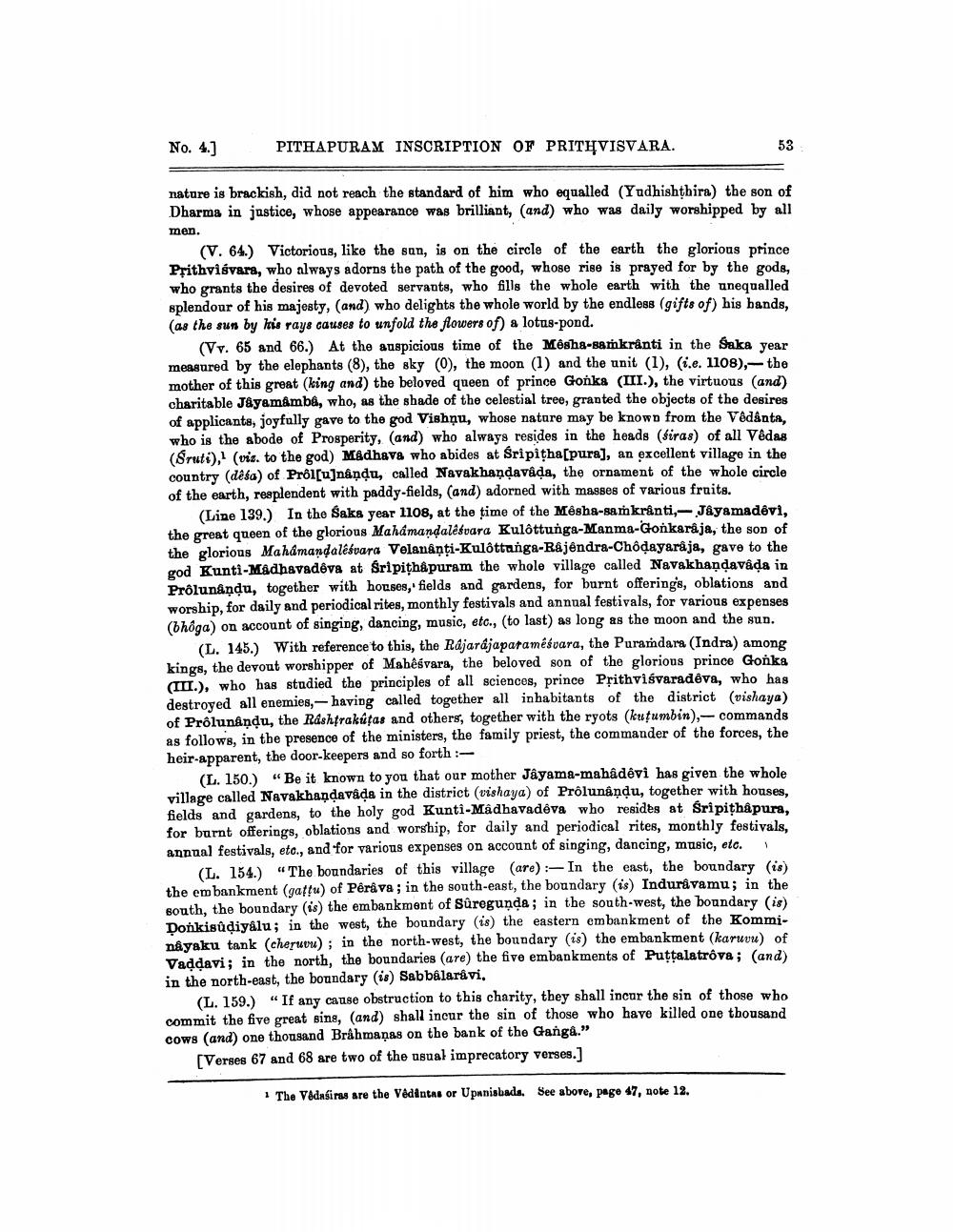________________
No. 4.]
PITHAPURAM INSCRIPTION OF PRITHVISVARA.
53
nature is brackish, did not reach the standard of him who equalled (Yudhishthira) the son of Dharms in justice, whose appearance was brilliant, (and) who was daily worshipped by all men.
(V. 64.) Victorious, like the sun, is on the circle of the earth the glorious prince Prithvisvara, who always adorns the path of the good, whose rise is prayed for by the gods, who grants the desires of devoted servants, who fills the whole earth with the unequalled splendour of his majesty, (and) who delights the whole world by the endless (gifts of) his hands, (as the sun by his rays causes to unfold the flowers of) a lotus-pond.
(Vv. 65 and 66.) At the auspicious time of the Mesha-samkranti in the Saka year measured by the elephants (8), the sky (0), the moon (1) and the unit (1), (i.e. 1108), the mother of this great (king and) the beloved queen of prince Gonks (III.), the virtuous (and) charitable Jayam&mba, who, as the shade of the celestial tree, granted the objects of the desires of applicants, joyfully gave to the god Vishnu, whose nature may be known from the Vedanta, who is the abode of Prosperity, (and) who always resides in the heads (Siras) of all Vedas (Sruti), (vis. to the god) Madhava who abides at Sripitha(pura], an excellent village in the country (dēša) of Prôl[u]nându, called Navakhandavada, the ornament of the whole circle of the earth, resplendent with paddy-fields, (and) adorned with masses of various fruits.
(Line 139.) In the Saks year 1108, at the time of the Mêsha-samkranti,- J&yamadêvi. the great queen of the glorious Mahamandalesvara Kulôttunga-Manma-Gonkaraja, the son of the glorious Mahamandalesvara Velanånti-Kulôttanga-Rajendra-Chodayarå ja, gave to the god Kunti-Madhsvadêva at Sripithapuram the whole village called Navakhandavâda in Prôlunându, together with houses, fields and gardens, for burnt offerings, oblations and worship, for daily and periodical rites, monthly festivals and annual festivals, for various expenses (bhôga) on account of singing, dancing, music, etc., (to last) as long as the moon and the sun.
(L. 145.) With reference to this, the Rajarajaparaméscara, the Purandara (Indra) among kings, the devout worshipper of Mahêsvara, the beloved son of the glorious prince Gonks (III.), who has studied the principles of all sciences, prince Přithviśvaradêva, who has destroyed all enemies, having called together all inhabitants of the district (vishaya) of Prôlunandu, the Rashtrakútas and others, together with the ryota (kutumbin), commands as follows, in the presence of the ministers, the family priest, the commander of the forces, the heir-apparent, the door-keepers and so forth:
(L. 150.) "Be it known to you that our mother Jayama-mahadevi has given the whole village called Navakhandavada in the district (vishaya) of Prolunându, together with houses, fields and gardens, to the holy god Kunti-Madhavadêva who resides at Sripithapura, for burnt offerings, oblations and worship, for daily and periodical rites, monthly festivals, annual festivals, etc., and for various expenses on account of singing, dancing, music, etc.
(L. 154.) "The boundaries of this village (are) :- In the east, the boundary (is) the embankment (qaftu) of Pêråva; in the south-east, the boundary (is) Indurivamu; in the south, the boundary (is) the embankment of Sûregunda; in the south-west, the boundary (is) Donkisúdiyalu; in the west, the boundary (is) the eastern embankment of the Komminäyaku tank (cheruvu); in the north-west, the boundary (is) the embankment (karuvu) of Vaddavi; in the north, the boundaries (are) the five embankments of Puttalatrova; (and) in the north-east, the boundary (is) Sabbalaravi,
(L. 159.) “If any cause obstruction to this charity, they shall incur the sin of those who commit the five great sing, (and) shall incur the sin of those who have killed one thousand Cows (and) one thousand Brühmaņas on the bank of the Ganga.”
[Verses 67 and 68 are two of the usual imprecatory verses.]
The Vedasiras are the Vedintas or Upanishada. See above, pago 47, note 12.




